Sat 22 May 2010
David L. Vineyard Reviews Two by VICTOR CANNING.
Posted by Steve under Authors , Reviews[9] Comments
VICTOR CANNING –
â— The Finger of Saturn. Wm. Heinemann, UK, hardcover, 1973. William Morrow & Co., US, hc, 1974. Paperback reprints include: Pan, UK, 1975; Pyramid, US, 1975.
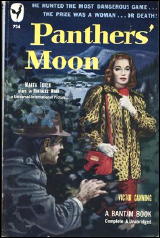
These two novels from Victor Canning span the course of his long career. The first, Panthers’ Moon (1948), was his second thriller after returning to writing following WW II, while The Fingers of Saturn (1973) came from his most diverse, prolific, and successful era.
Canning was the third man in the top three thriller writers of his period. If you grant that Eric Ambler and Graham Greene stand alone, then the top three of the period were Hammond Innes, Geoffrey Household, and Victor Canning. They had spectacular sales, uniformly rave reviews, and Hollywood came calling frequently. Canning is unjustly neglected today.
Canning began writing largely humorous novels in the late thirties, took some time off after the war and came back with The Chasm, a thriller. His second thriller is Panthers’ Moon, which is a classic of its kind, a perfect mix of essential elements.
The typical Canning hero is a professional, a country man, and a sportsman, but within that type he manages quite a bit of variation from innocents abroad to professional assassins.
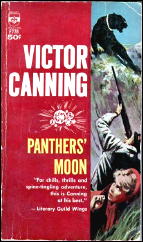
Roger Quain is an engineer asked to help an old friend who owns a circus transport a pair of leopards, a male and a female, who were kept as pets by a wealthy Italian nobleman.
Quain respects the animal and recognizes the hatred in the beast’s eyes. Back at his hotel Quain is approached by Catherine Talbot, a British Agent, who tells him she has important information she must get out and cannot because she is being watched. The information is in the form of microfilm. Quain agrees to get it out and hides the microfilm in the collar of the male leopard.
Then the Simplon-Orient Express, on which Quain is transporting the two cats, is wrecked in the Alps and the cats are on the loose. Quain has to recover the animals and the microfilm, and just who he can or can’t trust is a question. Denson, the American journalist who interviewed him before he left Italy, the seductive Carlotta, Valecchi the fat man, Copelnancer the professional hunter, and what of Parradou the policeman?
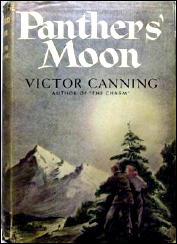
And as you might expect Quain himself will become the hunted and the hunter beneath the Alpine Panthers’ moon:
This one was filmed as Spy Hunt, with Howard Duff and Marta Toren, Walter Slezak as Valecchi, and Robert Douglas as Copelnancer. It’s a solid little film, a minor A production, a little set bound, but making the most of the elements of the cinematic novel.
The Finger of Saturn from two decades later is a darker book. Canning had become disenchanted with the games played by the Security Services and portrayed them as ruthless and vicious. He himself had divorced his wife and become involved with another woman, prompting the most productive period of his career. It was in this period he wrote what may be his masterpiece, The Rainbird Pattern, filmed by Alfred Hitchcock as The Family Plot.
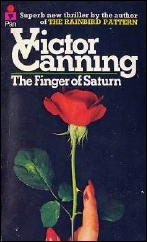
The Finger of Saturn is the middle finger, and when it is shorter than the other two fingers surrounding it old wives’ tales imply something sinister. And as we all know not all old wives tales are wrong …
Robert Rolt used to be something in the Foreign Office, as his father an ambassador had been. Now he takes care of the family estates, Rolthead, a gentleman farmer and land owner. Up to two years earlier he was ecstatically happy with his wife Sarah, but then she went missing.
Now someone from the Foreign Office shows up with film that shows a woman who looks suspiciously like Sarah. When Rolt goes to visit her he discovers she is Sarah, and has no memories of her past, he convinces her to come home.
But when they go to visit her mother in Italy they are nearly killed. An accident — or something more sinister. And now a man named Garwood, Deputy Director Statistical Projects of the Ministry of Defense has approached Rolt. Sarah’s family is tied closely to a mysterious group, International Industrial Systems Limited, I.I.S.L. and they would like to know just how closely. All he really knows about his mother in law is that she has made some eccentric donations …
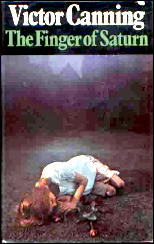
“That doesn’t strike me as being odd, Mr. Rolt. Backing science after all is …”
“This isn’t science! This is the rankest kind of nonsense. These are crackpot organizations who believe in little green men from Mars and unidentified flying saucers.”
Soon enough it becomes obvious what Garwood and company want from Rolt. They want him to destroy I.I.S.L.’s secret headquarters at Caradon Abbey in Cornwall, where only he, with Sarah’s contacts, can penetrate their sinister secrets and those of the woman he loves more than anything in the world.
I won’t give away what Rolt finds, but suffice it to say it is unique among Canning’s novels and he brings it off beautifully as only a true master could.
To have produced one of these books in a career would be accomplishment enough. To produce two of them a bit over twenty years apart is remarkable.
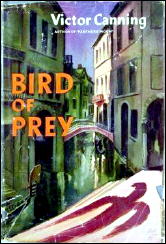
That this same career included such books as Castle Minerva, The House of Seven Flies, The Golden Salamander, Birdcage, Queen’s Pawn, The Great Affair, The Limbo Line, Firebird, and Bird of Prey, as well as his best selling Arthurian novels and his works the basis for films such as The Golden Salamander, The House of the Seven Hawks, The Venetian Bird, Masquerade, Shark, and The Family Plot is a sign of his qualities as a writer (his film and television credits are too numerous to produce here).
Hopefully his work will be rediscovered and reprinted. He’s too good to be forgotten, and writers with his ability too rare to remain unread by future generations. These two are fine examples of his best, but there are many more equal or superior to them.
Almost any of his thrillers are worth reading for lovers of international intrigue, suspense, action, and adventure. He even ventured into humor in The Great Affair, and to some extent his popular private eye series about Rex Carver, a Brit eye with a six foot tall secretary and a penchant for international intrigue.
Canning was a Silver Dagger winner and named a Grand Master by the British Crime Writers Association. Grand Master was never a more deserved title. Lovers of the British thriller would be wise to learn his name and read as many of his books as they can find. No one did it better.
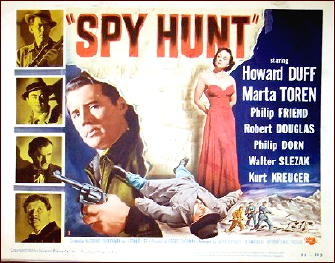
Previously on this blog —
SCORPIO ROOMS: VICTOR CANNING ON TV, by Tise Vahimagi.
VICTOR CANNING – A Fall from Grace (A 1001 Midnights Review by John Lutz).
VICTOR CANNING – The Limbo Line. (Reviewed by David Vineyard).
MASQUERADE (1965). Based on the novel Castle Minerva by Victor Canning. (A movie review by David Vineyard.)
May 22nd, 2010 at 5:23 pm
I discovered those Berkley editions in the ’60s, and I think I must have read all of them. Canning was definitely one of the top guys.
May 22nd, 2010 at 8:07 pm
Bill
I was thinking exactly the same thing. So much so that I’ve been trying to put together a list of those Berkley books:
F-730 The House of the Seven Flies (1963).
F-746 The Man from the “Turkish Slave” (1963).
F-758 The Golden Salamander (1963)
F-778 Panthers’ Moon (1963).
F-802 The Chasm (1963).
F-810 Bird of Prey (1963).
F-874 A Forest of Eyes (1964).
F-881 Burden of Proof (1964).
F-889 A Handful of Silver (1964).
F-914 A Delivery of Furies (1964).
F-1038 Black Flamingo (1965).
F-1085 The Limbo Line (1965).
If I’ve missed any, I hope someone will let me know.
— Steve
May 22nd, 2010 at 8:14 pm
The mid-1960s was a good time to be a mystery fan, especially if all you could afford were paperbacks and book club editions.
Following up on Berkley, for example, they also did long runs of books by Carter Dickson, Michael Innes, Elizabeth Daly, Alan Hunter’s “Gently” books, John Creasey, Manning Coles, Ngaio Marsh, Arthur W. Upfield, Philip McCutchan, John P. Marquands’s Mr. Moto novels and Nicholas Blake.
Not too shabby a lineup!
And who’s doing anything like that today?
May 23rd, 2010 at 5:03 am
When I first started reading mysteries in Middle School about half my library consisted of Berkley books — including those handsome Sherlock Holmes editions with beautiful covers by W. Teason.
And as your list shows they introduced me to Creasey’s Roger West, Upfield’s Bony, Mr. Moto, Sir Henry Merrivale, Alleyn, Tommy Hambledon, Nigel Strangeways, McCutchan’s Commander Esmond Shaw spy series. and M.G. Braun’s French spy Al Glenne. And at the time they were also home of J.G. Ballard’s science fiction novels, which I might not have even noticed if they hadn’t been listed in the backs of some of the others.
Canning was a big part of that lineup and along with Avon’s Hammond Innes issues and Pyramid’s Households were my introduction to the British thriller tradition.
At the time I remember associating certain publishers with series and characters in a way you don’t today. Christie at Pocket Books, Dell and Bantam, Brett Halliday and Frank Kane at Dell, Spillane and Fleming at Signet, Charlie Chan at Paperback Library, the Gold Medal lineup, Ross Macdonald, Rex Stout, and John Dickson Carr (some of the most attractive covers ever done for a mystery series) at Bantam, Mary Stewart at Fawcett and more. It was a good time to discover genre fiction — the first pulp reprints were starting up and there was a wide variety of titles available at reasonable prices in attractive formats across the board. You could afford to experiment with writers you might not like, and you were out no more than 50 or 60 cents if you did.
For once, the good old days really were good old days. True there is more rare material available today, but then they take a much larger chunk out of the pocket book than they used to even if you know where and how to shop for them.
May 23rd, 2010 at 3:57 pm
That’s an odd coincidence, David. At the end of April I took a week off in the Bay of Islands. In the course of travel, I picked up at a small-town charity shop the UK hardcover of Finger of Saturn complete with the dj pictured here. The book was priced at a ridiculous 50c. It was many, many years since I’d read any Canning and renewing acquaintance provided some excellent reading, though this isn’t a book for people who insist on neat, happy endings. The principals proved star-crossed to say the least. Way back when I was a kid, a London evening newspaper published a week of short shorts by Canning called The Six Deaths of Dr Kang/. I carefully clipped those stories out, complete with their illustrations, and pasted them into a school exercise book. Astonishingly, I still have that “souvenir” today. It’s indicative of the range of Canning’s talent that he was as adroit with short fiction as with the longer novel.
June 3rd, 2010 at 7:33 am
Chap O’Keefe may be interested to know that The Six Deaths of Dr Kang are included in my recent collection of Victor Canning short stories, The Minerva Club, published by Crippen and Landru.
October 27th, 2010 at 8:33 pm
[…] books, most recently David Vineyard’s review/essay of two of his novels, which you can find here. […]
February 10th, 2011 at 6:16 am
Thought I would post this here for any Canning fans. I just discovered that SUPER DETECTIVE PICTURE LIBRARY, a series of digest size paper cover comic book adaptations from the UK that covered characters like Sexton Blake, Bulldog Drummond, the Saint, Sherlock Holmes, the Toff, Rip Kirby, and many more, also adapted several Victor Canning novels to that format.
Those I know if include PANTHER’S MOON, FOREST OF EYES, OASIS NINE, and THE MAN FROM TURKISH SLAVE (as JEWEL SMUGGLERS). Canning is about the last writer I would have thought of getting this treatment since he is fairly adult, but it still makes a nice addition to his bibliography, and many of these can be found at reasonable prices, ranging from around $22 to $100.
SDPL also had many of their own creations like Leslie Shane (a blonde female) and the British tec comic strip Buck Ryan as well as books by Edgar Wallace and others.
April 26th, 2021 at 3:26 am
An update in case anyone is reading these old reviews most to the Super Detective Library titles including the Cannine titles are available for free download or online reading either from Comic Book Plus or Internet Archive, and among those mentioned above also include Blackshirt, Edgar Wallace, John Steel Secret Agent, Roderick Random a SF/Detective, and Inspector Chaffik.